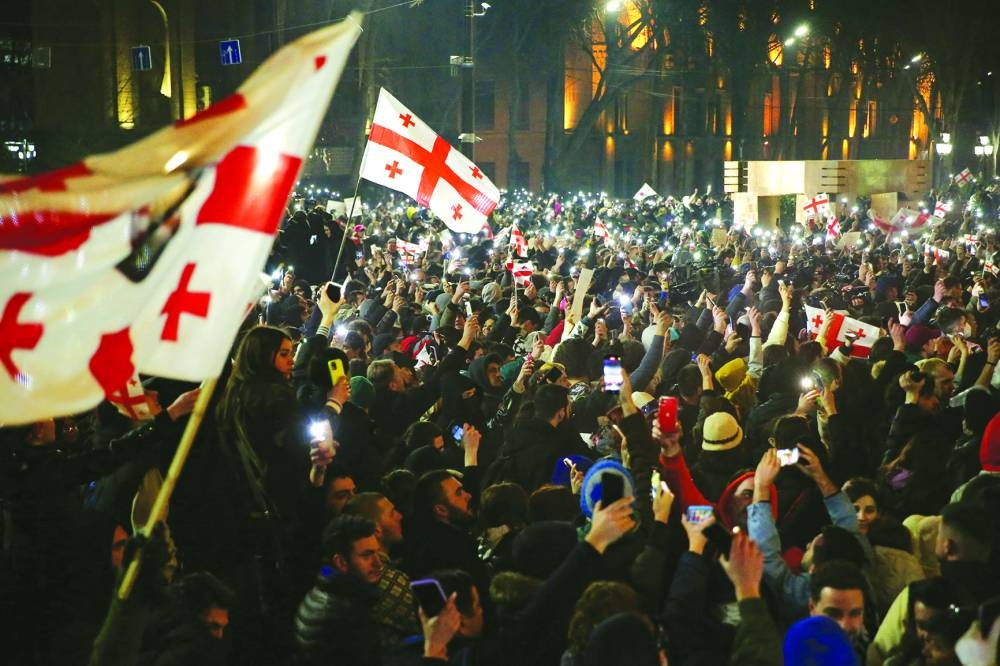Georgia’s parliament has dropped plans for a “foreign agents” bill that had triggered a political crisis and threatened to harm the country’s bid for closer ties with Europe.
Lawmakers voted against the legislation in the second reading yesterday after the ruling Georgian Dream party pulled its support for the bill following three nights of protests in the capital Tbilisi.
The bill would have required non-government organisations (NGOs) that receive more than 20% of their funding from abroad to register with Georgia’s justice ministry as an “agent of foreign influence”.
Opponents said the plan was anti-democratic and pushed the country in an increasingly authoritarian direction.
They also said it was modelled on a 2012 Russian law that Moscow has used extensively to crack down on civil society and independent media, a claim denied by Georgian Dream.
The plan has fuelled domestic criticism of the government as being too close to Moscow, in contrast to Georgian public opinion, which is fiercely anti-Russian.
Government officials continued to defend the bill yesterday even after they let it be defeated in parliament.
Georgian Dream chairman Irakli Kobakhidze said the proposals would increase transparency, unmask critics of the powerful Georgian Orthodox Church and expose foreign forces he said were helping groups “to push LGBT propaganda” and criticise Georgia’s electoral system.
The bill had cleared its first reading earlier this week after lawmakers brawled in the chamber over the plans, but tens of thousands of protesters then took to the streets of Tbilisi.
They welcomed the government’s climbdown.
“This law is not the law that we need. This is the happiest moment in my life. We have won. But we have a long way to fight to become a member of the European Union,” Eka Asatiani told Reuters outside parliament yesterday.
Both the EU – which had indicated the proposals were incompatible with membership of the bloc – and the United States also welcomed the decision to drop the bill.
Asked about similarities with its own “foreign agent” legislation, the Kremlin said it had no involvement in the Georgian bill and rejected suggestions that it was Russian-inspired.
Georgian Dream lawmakers had said the bill was based on the United States’ Foreign Agents Registration Act, which primarily covers lobbyists working directly for foreign governments.
Washington has rejected that comparison.
Following yesterday’s vote, ruling party chairman Kobakhidze said the public debate around the bill had raised awareness about the issues of foreign funding for groups in Georgia.
It was unclear whether the government might try to revive the legislation in the future.
Georgian Dream had indicated in a statement on Thursday that it still favours the proposals, and analysts said the issue was unlikely to disappear ahead of elections scheduled for next year.
“As usual (with) Georgian Dream, they make two steps forward, one step back. I think they just lost tactically now, but strategically I don’t think they will change,” said Kornely Kakachia, director of the Georgian Institute of Politics.
Yesterday Moscow accused foreign countries of fomenting mass protests in Georgia, likening them to an attempted coup designed to sow tension on Russia’s borders.
Russian Foreign Minister Sergei Lavrov said that several days of demonstrations in the Georgian capital Tbilisi reminded him of a Ukrainian uprising that ousted a Kremlin-friendly government in 2014.
“There is no doubt that the law on the registration of non-governmental organisations was used as an excuse to start, generally speaking, an attempt to change the government by force,” said Lavrov.
The protests looked similar to “Kyiv’s Maidan” uprising, he said, and “are of course being orchestrated from abroad” with the aim of creating “an irritant on the borders of Russia”.

Georgian opposition supporters rally calling for government to follow ‘pro-Western’ path, outside the parliament in Tbilisi.
